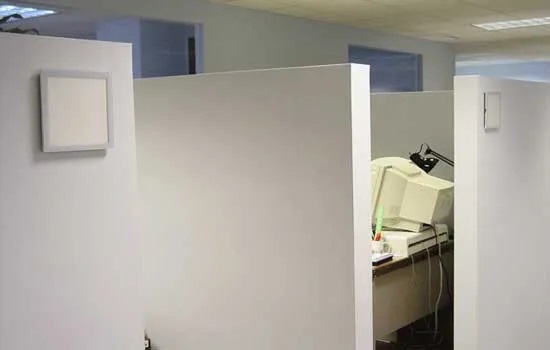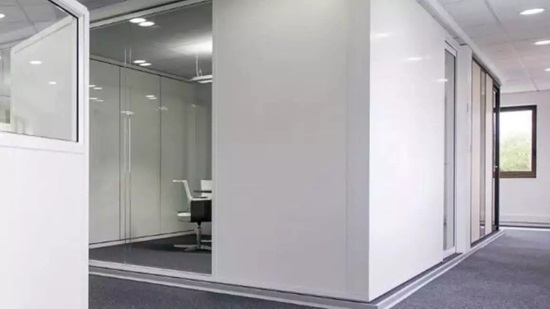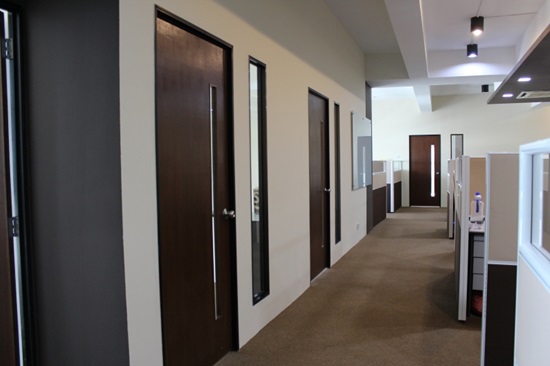Advantages and disadvantages of using gypsum partition walls in buildings
In buildings, partition walls play an important role in dividing spaces and creating organization and order within the structure. In this article, we will examine the advantages and disadvantages of using gypsum partition walls in buildings.

Advantages of gypsum partition walls:
1.Ease of installation and construction:
One prominent advantage of using gypsum partition walls is the ease of installation and construction. These walls can be easily cut and shaped, and they do not require complex equipment or lengthy installation time. This reduces costs and project execution time.
2.Insulation properties:
Gypsum partition walls have excellent insulation properties. They can effectively absorb and insulate sounds, heat, and cold. This feature can contribute to improving the quality of life inside the building and reducing energy consumption.
3.Fire resistance:
Gypsum partition walls have the ability to resist fire. In the event of a fire, these walls can stop the fire for a certain period and control its spread to other parts of the building. This feature can increase building safety and provide sufficient time for people to evacuate.
4.Sound insulation:
Gypsum partition walls have the ability to reduce sound. They can effectively absorb unwanted sounds and prevent their transmission to other spaces. Gypsum partition walls have good sound insulation properties, which can absorb and reduce unwanted sounds, making the interior environment better and more peaceful. This property is particularly useful in residential, commercial, and educational spaces where noise control is important.
5.Flexibility:
Gypsum partition walls allow for flexibility in design and construction. With these walls, spaces can be quickly and easily modified, and the internal structure of the building can be adjusted according to new needs.
6.Lightweight structure:
Gypsum partition walls are lighter compared to traditional walls. This makes them easier to transport, move, and install.

Disadvantages of gypsum partition walls:
While gypsum partition walls have numerous advantages, they also have a few disadvantages that should be considered:
1.Weak physical resistance:
Gypsum partition walls are less resistant to impacts and strong pressures compared to walls made of harder materials such as concrete. This can lead to quicker damage and the need for frequent repairs.
2.Sensitivity to moisture:
Gypsum partition walls are more sensitive to moisture. If exposed to excessive water and humidity, the surface of the wall may be damaged, leading to cracks and dryness that require repairs.
3.Limitations in use:
Gypsum partition walls have fewer capabilities for installing heavy objects such as shelves or heating devices compared to stone or concrete walls. This can create limitations in building design and interior decoration.
4.Structural resistance limitations:
Gypsum partition walls have lower structural resistance compared to walls made of harder materials like concrete. This means that there is a higher risk of damage and quicker occurrence of cracks in gypsum walls when faced with impacts or strong pressures.
5.Limited resistance to moisture:
Using gypsum partition walls in high humidity areas may cause surface damage to the gypsum. Moisture can lead to cracks and dryness in gypsum walls, requiring regular repairs and maintenance.
6.Limitations in supporting heavy objects:
Gypsum partition walls usually cannot support the weight of heavy objects. This means they cannot be used as a support for installing heavy cabinets, for example. If there is a need to install heavy objects, a stronger structure such as concrete walls should be used.
7.Limited load-bearing capacity:
Gypsum partition walls have lower load-bearing capacity compared to walls made of stronger materials like concrete. They are not suitable for supporting heavy loads or structural elements.

8.Durability and vulnerability to impact:
Gypsum partition walls generally have less durability compared to walls made of harder materials. They may be more sensitive to damage from impacts, heavy objects, or accidental collisions. Special care is required to prevent scratches, holes, or cracks in the walls.
9.Limitations in design flexibility:
Gypsum partition walls may have limitations in design flexibility. They are typically installed as flat and smooth panels and may not easily accommodate complex architectural structures or curved surfaces.
It is important to evaluate these factors and consider the needs, building environment, and relevant regulations to make an informed decision regarding the use of gypsum partition walls. Consulting with experts in the field can provide helpful guidance and informed decision-making.
In summary, gypsum partition walls come with their own advantages and disadvantages. When choosing the appropriate type of wall for a building, factors such as intended use, environmental conditions, structural requirements, and personal preferences should be taken into account. Additionally, adhering to relevant standards and guidelines in the design and construction of gypsum partition walls, as well as seeking assistance and advice from reputable professionals in this field, is recommended.
Conclusion:
The use of gypsum partition walls in buildings comes with specific advantages and disadvantages. These walls offer ease of installation, insulation properties, and fire resistance. However, they also have weaknesses in physical resistance, sensitivity to moisture, and limitations in their use. Ultimately, the decision to use gypsum partition walls should be made based on the specific needs and conditions of each project, and the advantages and disadvantages should be properly considered and utilized.
By purchasing gypsum partition walls from the Bana collection, you can experience a reliable and satisfying buying experience.